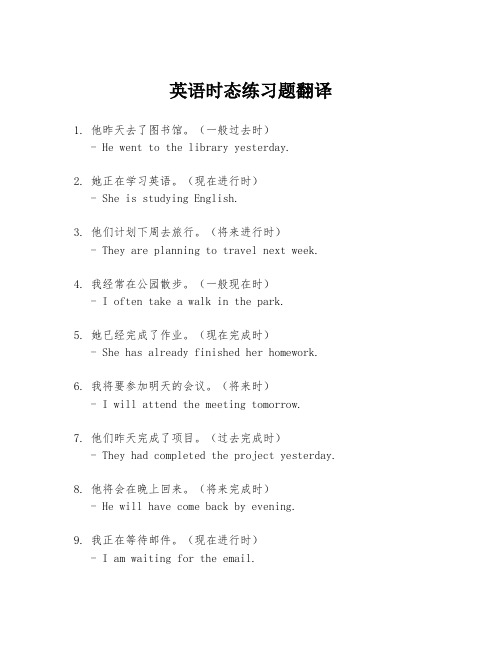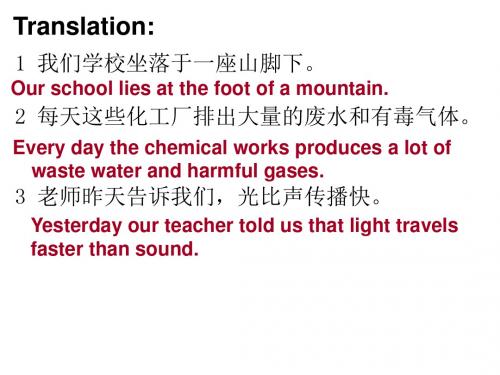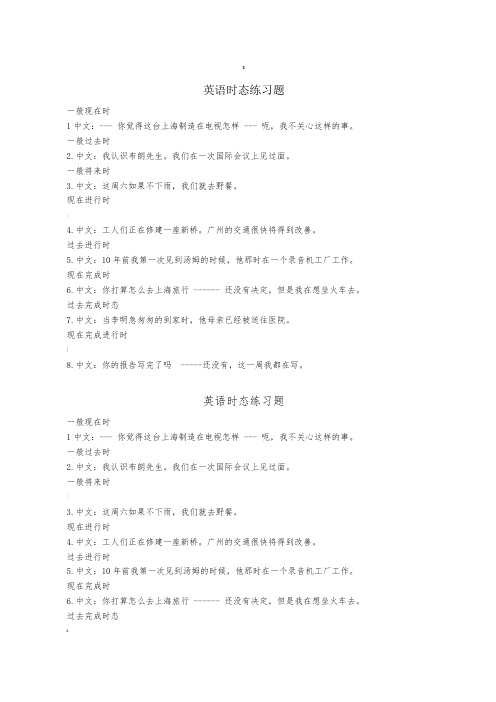初中英语时态练习句子翻译
英语时态练习题翻译

英语时态练习题翻译1. 他昨天去了图书馆。
(一般过去时)- He went to the library yesterday.2. 她正在学习英语。
(现在进行时)- She is studying English.3. 他们计划下周去旅行。
(将来进行时)- They are planning to travel next week.4. 我经常在公园散步。
(一般现在时)- I often take a walk in the park.5. 她已经完成了作业。
(现在完成时)- She has already finished her homework.6. 我将要参加明天的会议。
(将来时)- I will attend the meeting tomorrow.7. 他们昨天完成了项目。
(过去完成时)- They had completed the project yesterday.8. 他将会在晚上回来。
(将来完成时)- He will have come back by evening.9. 我正在等待邮件。
(现在进行时)- I am waiting for the email.10. 他昨天没有来,因为他生病了。
(过去进行时)- He didn't come yesterday because he was sick.11. 她将会在明天之前完成报告。
(将来完成时)- She will have finished the report by tomorrow.12. 他们正在讨论会议的安排。
(现在进行时)- They are discussing the meeting arrangements.13. 我刚刚完成了我的工作。
(现在完成时)- I have just finished my work.14. 他将会在周末之前完成这项工作。
(将来完成时)- He will have completed this work by the weekend.15. 我将要开始学习新的课程。
时态语态翻译句子

Just now he said a lot of work had been finished.
6 她正在思考某些东西,就在此时她的同事走了进来。
She was considering something when 7 他he们r 总wo是rk乐m于at助e 人ca。me in.
They are always helping others willingly.
8 她一边看电视一边织毛衣。 She was watching TV while / as she was weaving a wool.
9 我姐姐自从大学毕业以来,一直在这个公司工作。 My elder sister has been working in this company since she graduated from university.
10 他昨天说他们下周举行运动会。
Yesterday he said they were going to have a sports meeting.
Translation:
1 我们学校坐落于一座山脚下。
Our school lies at the foot of a mountain.
2 每天这些化工厂排出大量的废水和有毒气体。
Every day the chemical works produces a lot of waste water and harmful gases.
3 老师昨天告诉我们,光比声传播快。
Yesterday our teacher told us that light travels faster than sound.
4 我们明天考试。 we are to take an exam tomorrow.
时态翻译练习

时态翻译练习7、现在完成时1)很幸运,下雨前我们已经到家了。
Luckily, we had got home before it began to rain.2)张华说他的笔记本丢了。
Zhang Hua said he had lost his notebook.3)他曾告诉过我,会议两点钟开。
可是当我到了以后,我还得等到两点半。
He had told me that the meeting was at 2, but when I arrived I had to wait till 2:30.4)他在这里住了两三天,才觉得没有什么拘束(feel at home)。
When he had stayed here for two or three days, he began to feel at home.8、过去完成进行时(1)形式:had been + 动词的现在分词。
(2)用法:表示一直持续到过去某个时间的行为动作,此行为动作或刚结束、或还没结束(可以从上下文看出)。
这一时态经常与一般过去时一起使用。
例如:When he came in, I had been trying to repair the TV for a couple of hours. 他进来的时候,我一直在努力修理电视机好几个小时了The roads were dangerous. It had been raining for two whole days. 道路很危险。
雨一直下了两整天。
They were tired because they had been digging since dawn. 他们累了,因为从天亮开始他们就一直在挖。
The boy was delighted with the new mountain bike. He had been hoping for one for a long time. 那男孩得到一辆新山地自行车很高兴。
中考英语时态翻译练习

中考英语时态翻译练习### 中考英语时态翻译练习一、一般现在时1. 我每天早晨读英语。
2. 他们经常在周末去图书馆。
3. 地球绕着太阳转。
二、一般过去时1. 昨天我去了书店。
2. 去年夏天我们去了海边。
3. 他昨天没有完成作业。
三、一般将来时1. 明天我将去看电影。
2. 明年我打算去英国留学。
3. 下周我们将有一个英语考试。
四、现在进行时1. 他正在读一本书。
2. 我们正在学习英语。
3. 现在外面正在下雨。
五、过去进行时1. 昨天晚上我正在看电视。
2. 当我到达时,他们正在吃饭。
3. 昨天下午我正在图书馆学习。
六、现在完成时1. 我已经完成了作业。
2. 他们已经去过中国。
3. 他刚刚完成了他的报告。
七、过去完成时1. 我到达时,电影已经结束了。
2. 他来之前,我已经做了大部分工作。
3. 到去年为止,他已经学了五年英语。
八、将来完成时1. 到明天这个时候,我将已经完成了我的项目。
2. 明年这个时候,我们将已经完成了所有的课程。
3. 到年底,我们将会已经实现了我们的目标。
九、现在完成进行时1. 他一直在学习英语,已经学了三年了。
2. 我们一直在努力工作,已经取得了一些进展。
3. 她一直在等待消息,已经等了几个小时了。
十、过去完成进行时1. 他一直在学习,直到考试结束。
2. 他们一直在工作,直到项目完成。
3. 我一直在读书,直到我累了。
练习答案一、一般现在时1. I read English every morning.2. They often go to the library on weekends.3. The Earth revolves around the Sun.二、一般过去时1. I went to the bookstore yesterday.2. We went to the seaside last summer.3. He didn't finish his homework yesterday.三、一般将来时1. I am going to watch a movie tomorrow.2. I plan to study in the UK next year.3. We will have an English exam next week.四、现在进行时1. He is reading a book.2. We are studying English.3. It is raining outside now.五、过去进行时1. I was watching TV last night.2. They were having dinner when I arrived.3. I was studying in the library yesterday afternoon.六、现在完成时1. I have finished my homework.2. They have been to China.3. He has just finished his report.七、过去完成时1. The movie had ended by the time I arrived.2. I had done most of the work before he came.3. He had been learning English for five years by last year.八、将来完成时1. By this time tomorrow, I will have finished my project.2. By this time next year, we will have completed all our courses.3. By the end of the year, we will have achieved our goals.九、现在完成进行时1. He has been learning English for three years.2. We have been working hard and have made some progress.3. She has been waiting for the news for several hours.十、过去完成进行时1. He had been studying until the exam was over.2. They had been working until the project was completed.3. I had been reading until I was tired.。
动词时态语态句子翻译

动词时态语态句子翻译
1.他很开心,因为他卖光了所有的报纸。
Sell out 卖光
2.因为下雨,计划推迟了。
put off 推迟
3.这些日子你去了哪里
4.Tom在哪里---他去了邮局。
他很快就回来。
5.Mike完成学业后他想成为一个老师。
6.他完成了他的所有作业才去睡觉了。
7.光传播速度比声音快得多。
8.吃了药后我感觉好多了。
9.我们在哪里见面
10.我担心他明天不会来我们学校。
11.我的自行车掉了。
12.这个商店一般10点开门。
13.昨天晚上你在哪里
14.这个电视机是三天前买的。
15.我会一直等他到他回来。
16.这三年我去过日本5次。
17.据说明天要下雨。
18.我们一天前在山上种了10棵树。
19.长城闻名于世界。
20.夏天的时候街灯一般几点开。
时态练习题(带中文翻译)

$英语时态练习题一般现在时1中文:--- 你觉得这台上海制造在电视怎样 --- 呃,我不关心这样的事。
一般过去时2.中文:我认识布朗先生。
我们在一次国际会议上见过面。
一般将来时3.中文:这周六如果不下雨,我们就去野餐。
现在进行时:4.中文:工人们正在修建一座新桥。
广州的交通很快将得到改善。
过去进行时5.中文:10年前我第一次见到汤姆的时候,他那时在一个录音机工厂工作。
现在完成时6.中文:你打算怎么去上海旅行 ------ 还没有决定,但是我在想坐火车去。
过去完成时态7.中文:当李明急匆匆的到家时,他母亲已经被送往医院。
现在完成进行时]8.中文:你的报告写完了吗 -----还没有,这一周我都在写。
英语时态练习题一般现在时1中文:--- 你觉得这台上海制造在电视怎样 --- 呃,我不关心这样的事。
一般过去时2.中文:我认识布朗先生。
我们在一次国际会议上见过面。
一般将来时|3.中文:这周六如果不下雨,我们就去野餐。
现在进行时4.中文:工人们正在修建一座新桥。
广州的交通很快将得到改善。
过去进行时5.中文:10年前我第一次见到汤姆的时候,他那时在一个录音机工厂工作。
现在完成时6.中文:你打算怎么去上海旅行 ------ 还没有决定,但是我在想坐火车去。
过去完成时态&7.中文:当李明急匆匆的到家时,他母亲已经被送往医院。
现在完成进行时8.中文:你的报告写完了吗 -----还没有,这一周我都在写。
1 What do you think of this kind of TV set, which is made in Shanghai!--- Well, I don’t care about such things.2 I know Mr. Brown; we met each other at an international conference.it doesn’t this Saturday, we will go for a picnic.workers are a new bridge now. The traffic in Guangzhou will be better soon.I first met Tom 10 years ago, h e was working in a radio factory at that time.How are you planning to travel to Shanghai--- I haven’t decided yet, but I am considering taking a train.Li Ming hurried home, he found that his mother hadalready been taken to hospital.8. --- Have you finished the report…--- No. I have been doing it all this week.1 What do you think of this kind of TV set, which is made in Shanghai--- Well, I don’t care about such things.2 I know Mr. Brown; we met each other at an international conference.it doesn’t this Saturday, we will go for a picnic.workers are a new bridge now. The traffic in Guangzhou will be better soon.I first met Tom 10 years ago, h e was working in a radio factory at that time.>How are you planning to travel to Shanghai--- I haven’t decided yet, but I am considering taking a train.Li Ming hurried home, he found that his mother hadalready been taken to hospital.8. --- Have you finished the report--- No. I have been doing it all this week.1 What do you think of this kind of TV set, which is made in Shanghai--- Well, I don’t care about such things.2 I know Mr. Brown; we met each other at an international conference.]it doesn’t this Saturday, we will go for a picnic.workers are a new bridge now. The traffic in Guangzhou will be better soon.I first met Tom 10 years ago, h e was working in a radio factory at that time.How are you planning to travel to Shanghai--- I haven’t decided yet, but I am considering taking a train.Li Ming hurried home, he found that his mother hadalready been taken to hospital.8. --- Have you finished the report--- No. I have been doing it all this week.。
英语时态翻译练习

Is it easy to get along with him?
24.你应该尽可能地照顾好你的爷爷。
You should look after your grandfather as well as you can.
25.你能给我们介绍一下你自己吗?
Can you introduce yourself to us?
36.你通常怎样解决你的烦恼?(deal with)
How do you usually deal with \ solv了。
I can’t lend you money, because I have used it up. I can’t lend money to you, because I have run out of it.
Have you ever been to Hangzhou? Yes, I have. I went there a month ago. I have been there two or three times.
9.假如明天不下雨,我会去购物。
I will go shopping if it doesn’t rain tomorrow.
12.我生于1987年6月15日。
I was born on June 15, 1987.
13.我们学校里仅有六个女教师。 There are only six women teachers in our school. 14.你能告诉我现在几点了吗? Could you tell me what time it is / what the time is .
18. 学习英语对我们很重要。
It’s very important for us to learn English.
英语时态翻译练习题

英语时态翻译练习题### English Tenses Translation Exercises1. Past Simple Tense (一般过去时)- 中文原句:昨天我去了图书馆。
- 英文翻译: I went to the library yesterday.2. Present Simple Tense (一般现在时)- 中文原句:她每天早晨跑步。
- 英文翻译: She runs every morning.3. Past Continuous Tense (过去进行时)- 中文原句:昨天下午我正在写报告。
- 英文翻译: I was writing a report yesterday afternoon.4. Present Continuous Tense (现在进行时)- 中文原句:他们现在正在开会。
- 英文翻译: They are having a meeting now.5. Future Simple Tense (一般将来时)- 中文原句:明天我将去购物。
- 英文翻译: I will go shopping tomorrow.6. Past Perfect Tense (过去完成时)- 中文原句:他到达时,会议已经结束了。
- 英文翻译: The meeting had ended by the time he arrived.7. Present Perfect Tense (现在完成时)- 中文原句:我已经完成了我的作业。
- 英文翻译: I have completed my homework.8. Future Perfect Tense (将来完成时)- 中文原句:到明年这个时候,我将已经学会了法语。
- 英文翻译: By this time next year, I will have learned French.9. Present Perfect Continuous Tense (现在完成进行时)- 中文原句:他一直在学习英语,已经三年了。
- 1、下载文档前请自行甄别文档内容的完整性,平台不提供额外的编辑、内容补充、找答案等附加服务。
- 2、"仅部分预览"的文档,不可在线预览部分如存在完整性等问题,可反馈申请退款(可完整预览的文档不适用该条件!)。
- 3、如文档侵犯您的权益,请联系客服反馈,我们会尽快为您处理(人工客服工作时间:9:00-18:30)。
初中英语时态练习句子翻译This manuscript was revised by the office on December 22, 2012一.翻译下列各句:1稍等一会儿,我会帮助你的。
(for a while)2他们作了自我介绍。
(introduce)3请去查询下班火车什么时候开。
(find out)4昨天下午2时到4时你在做什么(过去进行时)5我正在吃晚饭,电话铃响了。
(when)6不仅我,而且汤姆和玛丽都喜欢游泳。
(be fond of)7他今天感到身体好多了。
(a lot)8礼堂里早已挤满了高中学生。
(be full of)9我在街上走时,看到了一些古老的建筑物。
(while)10我走近花园时,几个男孩子在爬树。
(用过去进行时)二.单选:1. – Jack?-- ____.A. Present, Sir.B. I am, SirC. Here, SirD. Yes, Sir.2.---What are you busy with--- We are carrying out a research ____ the causes of cancer.A. intoB. ontoC. toD. in3.---____ the paper--- No, I have still got one page to finish.A. Have you doneB. Do you doC. Did you doD. Had you done4._____ in all parts of the state, pines are the most common trees in Georgia .A. FoundB. Finding themC. To find themD. They are found5.They ___ the game.A. are disappointed at losingB. disappointC. are disappointingD. are disappointed6.– Will it rain tomorrow-- No. I don’t doubt ________.A. whether it will rainB. that it will rainC. whether it rainsD. that it rains7.Jasper is a great painter. He is _____ Picasso.A. as a great asB. as great painter asC. as great a painter asD. so great a painter as8.The great use of the school education is not so much to teach you things _____ to teach the art of learning.A. rather thanB. thanC. norD. as9.Travelling from England to Scotland you _______.A. needn’t a passportB. don’t need to have a passportC. needn’t to take a passportD. don’t need take a passport10.The radio doesn’t work well; it needs_________.A. fixingB. being fixedC. to fixD. fixed11.– I was trying to repair that stupid machine, but I failed.-- Well, you_______.A. need n’t do thatB. needn’t have doneC. needn’t haveD. needn’t12.The children had _____basketball.A. a great fun playingB. great fun playingC. great fun to playD. a great funny playing13. _____it is to jump into the water in hot summer!A. What funB. How funnyC. What a funD. How fun14. He has done a job which is _____as the one I have done.A. as wellB. as goodC. as betterD. so best15.The news finally came, which _____them all!A. disappointsB. disappointingC. disappointedD. disappoint AAAAA BCDBA CBABC动词及动词时态实义动词1)及物动词a.动词后要求有宾语,否则意思不完整的动词。
及物动词可有被动结构。
1.She studies English very hard.2.I always review my lessons in the evening.b. 及物动词的另两种结构及物动词中有少数动词要求一个宾语(直接宾语)外,还要求有一个宾语(间接宾语),才使句意完整。
这类动词有:leave, show, bring, lend, teach, give, tell, hand, write等。
I’ll tell you a story about Leifeng.还有少数动词要求一个宾语外,还要求有一个补足语来使句意完整。
这类动词有:name, call, get, have, find, turn, think, consider等。
They call him Lao Wang.2) 不及物动词不及物动词指不可带宾语的动词,也不可用于被动语态。
1.The sun rises in the east.2.He came last month.3.They go to school every day.3)连系动词连系动词只起连系作用,虽有词义但不能单独作谓语,后必须加表语一起构成谓语。
常用的连系动词有: appear, become, fall, feel, get, go, grow, keep, look, remain, seem, smell, sound, stay, taste, turn等。
1.She felt a bit tired.2.He kept silent at the meeting.注:连系动词不可与副词连用。
时态1)一般现在时用法:1.经常性动作等。
常与everyday, often, always, once a week, seldom, usually等连用。
She is our teacher of English.2.真理和事实。
Light travels faster than sound.3.有计划的动作,常用go, come, start, leave, arrive, return等动词。
I leave for Beijing next Monday.4.代替一般将来时,在由when, if, before, as soon as, unless等引导的时间,条件状语从句中,用一般现在时代替一般将来时。
When I grow up I shall be a soldier.5.动作正在发生,用在由here, there等开首的句子中,表示现在正在发生。
There goes the bell.6.表示主语的习惯特征,性格,能力等。
He studies very hard.7.一般的说明文字等。
The book says that women can live longer than men.2)一般过去时1.表示过去的某个时间发生的动作或存在的状态,常和明确的时间状语连用。
She went out just now.I saw him yesterday.2.表示过去经常发生的动作。
Last month she worked eleven hours every day.He used to get up early.3)一般将来时1.表示将来发生的动作或存在的状态。
I shall not be free tonight.2.表示将来经常发生的动作。
We will go for an outing every other week.3.表示将来动作的其他形式a.be going to+ 动词原形b.be to+动词原形c.be about(around/sure/certain//due/bound) to+动词原形4)过去将来时1.表示在过去将来的某一时间发生的动作或存在的状态。
I didn’t expect that so many people would offer their help.2.也可用was/were to+动词原形或was/were about to+动词原形或was/were going to+动词原形表示过去将来时。
I was about to leave when the telephone rang.5)现在进行时1.表示正在进行的动作。
What are you doing now?2.表示即将发生的动作.She is leaving tomorrow.3.表示现阶段正在进行的动作.More and more people are giving up smoking.4.表示反复发生的或习惯性的动作,常表示不满,抱怨,赞赏等.She is always finding fault with others.6)过去进行时1. 过去某一时刻在进行的动作.经常需要表示过去的时间状语.This time yesterday, they were having lunch.2.过去进行时常与一般现在时配合,互为时间背景.I was writing a letter when he came.The telephone rang while she was washing.3.过去反复的动作,常同always, frequently, continually等连用.They were frequently going there.7)将来进行时1.表示将来某一时刻正在进行的动作,常表示安排好的事.They will be discussing the problem this time next week.2.表示预料不久要发生或势必要发生的动作.The train will not be leaving until one o’clock.8)现在完成时1.表示动作刚刚完成.I have finished that work.2.表示过去做的动作对现在仍有影响.Who has opened the door?3.表示过去某时开始的动作一直延续到现在并且可能会延续下去.He has worked in the company since he came to the city.9)过去完成时1.表示在过去某一时间或动作之前已经完成的动作.By the end of 2002,the factory had produces 200000cars.2.表示在过去某一时间开始一直延续到另一个过去的时间的动作.The old man had been ill for a long time before he died in 2002.注:当含有由before, after, as soon as等引导的复合句中,由于连词本身可以明确表示动作发生的顺序,故主句和从句一般都用一般过去时.I went home after I finished my work.过去完成时常用于no sooner than和hardly, scarcely…when等句型,从句用一般过去时.He had hardly got on the train when the train started out.10)将来完成时表示将来某一时刻或某一行为发生之前所完成的动作或这一动作仍在持续.常和by或by the time等连用.By the end of this term, we shall have learned 18 lessons.1)现在完成进行时1.表示从过去某时一直持续到现在的一个动作.It has been snowing since last Sunday.2.重复的动作表示感情色彩.She’s been saying that twenty times.3.已结束的动作所产生的影响.You have been cleaning the classroom, I think.2)过去完成进行时表示过去某时以前一直进行的一个动作这一动作可能在这一时间前刚结束或仍在进行.No one knew what this dad egg had been doing all this years.Exercise1. -where ________ the recorder I can’t see it anywhere.-I _______ it right here, but now it’s gone.A. did you put; have putB. have you put; putC. had you put; have putD. were you putting; have put2. -When ________ again?-When he _____, I’ll let you know.A. he comes; comeB. will he come; will comeC. haven’t known; areD. will he come; comes3. They asked me to have a drink with them. I said that it was at least ten years since I _______ a good drink.A. had enjoyedB. was enjoyingC. enjoyedD. had been enjoying4. –Come in, Peter. I want to show you something.-Oh, how nice of you! I ______ you ________ to bring me a gift.A. never think; are goingB. never thought; were goingC. didn’t thi nk; were goingD. had been broken into; stolen5. The police found that the house _____ and a lot of things _______.A. has broken into; has been stolenB. had broken into; had been stolenC. has been broken into; stolenD. had been broken into; stolen6. –We could have walked to the station. It was so near.- Yes, taxi ______ at all necessary.A. wasn’tB. hadn’t beenC. servesD. served7. If city noises ______ from increasing, people _______ shout to be heard even at the dinner table 20 years from now.A. are not kept; will have toB. are not kept; have toC. do not keep; will have toD. was slipping; looked8. The last time I ______ Jane she ______ cotton in the fields.A. had seen; was pickingB. saw; pickedC. had seen; pickedD. saw; was picking9. In some parts of the world, tea ___ with milk and sugar.A. is servingB. is servedC. servesD. served10. The pen I ___ I _______ is on my desk, right under my nose.A. think; lostB. thought; had lostC. think; had lostD. had they known; got11. – Your phone number again I _____ quite catch it.- It’s 9568442.A. didn’tB. couldn’tC. don’tD. can’t12. Helen ___her keys in the office so she had to wait until her husband ___home.A. has left; comesB. left; had comeC. had left; cameD. had left; would come13. Nobody noticed the thief slip into the house because the lights happened to _____.A. be put upB. give inC. be turned onD. go out14. They _______ the train until it disappeared in distance.A. sawB. watchedC. noticedD. observed15. --- Sorry, Joe. I didn’t mean to…--- Don’t call me “Joe”. I’m Mr. Parker to you, and ____ you forget it!A. doB. didn’tC. didD. don’t16. News reports say peace talks between the two countries _______ with no agreement reached.A. have broken downB. have broken outC. have broken inD. have broken upKEY:1~5: BDABD 6~10:AADBB 11~16:ADDBDAMultiple choices:1. I wonder why Jenny ______ us recently. We should have hears from her by now.A. hasn’t writtenB. doesn’t writeC. won’t writeD. hadn’t written2. Mary _______ a dress when she cut her finger.A. madeB. is makingC. was makingD. makes3. On Saturday afternoon, Mrs. Green went to the market,________ some bananas anf visited her cousin.A. boughtB. buyingC. to buyD. buy4. The volleyball match will be put off if it ______.A. will rainB. rainsC. rainedD. israining5. -----We haven’t heard of Jane for a long a time.------What do you suppose ______to her?A. was happeningB. to happenC. has happenedD. having happened6. ---Do you know our town at all?---No, it’s the first time I ________ here.A. wasB. have beenC. cameD. am coming7. ---- You haven’t said a word abou t my new coat, do you like it? ---- I’m sorry, I ___ anything about it sooner. I certainly think it’s pretty on you.A. wasn’t sayingB. don’t sayC. won’t sayD. didn’t say8. We were all surprised when he made it clear that he ___ officer soon.A. leaveB. would leaveC. leftD. had left9. I _____ pingpong quite well, but I haven’t had time to play since the new year.A. will playB. have playedC. playedD. play10. He will have learned English for eight year by the time he______from the university next year.A. will graduateB. will have graduatedC. graduatesD. is to graduate11. Tom ______ back from France. Yesterday he ________ about it.A. just comes; toldB. has just come; told meC. came just; was told meD. just has come; was telling12. He said, “_______ much sand in the south of France.”A. There aren’tB. It isn’tC. It wasn’tD. There isn’t13. You shall have some ice-cream when you _________ you dinner.A. finishedB. finishC. will finishD. will be finished14. Thomas could fix your car. That ______ you quite a lot of money.A. savedB. has savedC. would saveD. was saving15. “Come back at 5 o’clock,” he said, “I’ve already_________.”A. will be doneB. has been doneC. is being doneD. was being done16. Maria hasn’t visited her home in Spain _________.A. for many yearsB. since many yearsC. many years sinceD. many years ago17. When ______ the car, you’ll agree with me about it.A. you sawB. you’ve seenC. you would seeD. has been seen18. By next Saturday Tom ___________ a whole month without smoking a cigar.A. will goB. will have goneC. has goneD. has been going19. By the time he reached the dentist, the pain in his tooth________.A. stoppedB. had stoppedC. Has stoppedD. as been stopped20. The old man _________ for three days when his son got back home.A. has been deadB. had been deadC. diedD. had diedKEY:1~5: ACABC 6~10:BDBDC 11~15:BDBCA16~20:ABBBBFill in the blanks:1. Much of the carbon in the earth ____________ (come) from thingsthat once lived.2. In the past two decades, research _______________ (expand) our knowledge about sleep and dream.3. Some proverbs ____________ (be) in the language for 1,000 years,for example, A friend in need is a friend indeed.4. ________________ (stand) at the gate was a young man in green coat.5. In 1991, after the Gulf War, Bush’s approved rating reached 91 percent, the highest level recorded since polling ________________ (begin) in the 19302.6. Seeing violence on television or reading about it in the newspapers every day ________________ (make) us tolerate crime more than we should.7. So far, Irving ______________ (live) in New York City for ten years.8. The patient ________________ (send) to another hospital before we got there.9. The second half of the nineteenth century _______________ (witness) the first extended translation into English of the writings ofEliphas Levi.10. All the worries they might have felt for him ________________ (drive) off by the sight of his cheerful face.Key:es 一般现在时,主语为不可数名词,谓语用单数2. has expanded 现在完成时3. has been 现在完成时4. Standing 过去进行时的倒装形式5.began 一般过去时6. makes 一般现在时,动名词做主语,谓语用单数7. has been living 现在完成进行时8. had been sent 过去完成时的被动形式9. witnessed 一般过去时10. were driven 一般过去时的被动。
